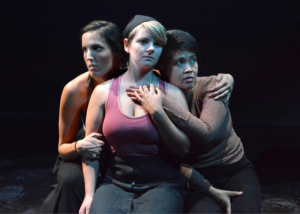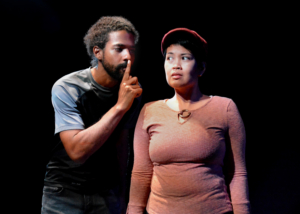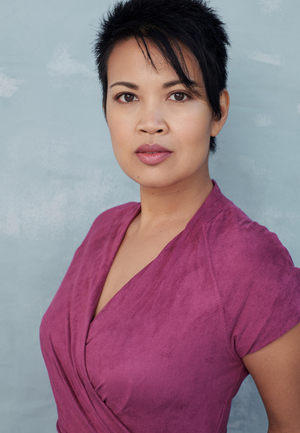Interview: Evie Abat of NEVER IS NOW at Skylight Theatre



The Skylight Theatre Company continues to provoke and encourage conversation and education. Their latest offering, opening September 21st, is a strong continuation of that tradition.
What happens when people from diverse backgrounds experience the firsthand accounts of ten survivors who were labeled 'undesirable' and thrust into Hitler's systematic genocide. Playwright Wendy Kout disturbingly links then and now so we may understand what breaks us apart and embrace what bonds us together. "Never is Now" is just the beginning of the conversation. "Never is Now" was adapted from Survivors by Wendy Kout commissioned, developed and produced by the CenterStage Theatre at the Louis S. Wolk Jewish Community Center of Greater Rochester, Ralph Meranto, Artistic Director.
I had a moment to sit down and chat with one of the actors from the production, Evie Abat:
BWW: Why did you feel that you needed to do this play?
E: I got called back for another theater project about social justice around the same time that I got called back for what was then called, "Survivors". So, basically, it was a toss-up between being part of an touring ensemble of women, playing empowered real-life female heroes, who survived injustice, vs being in a mixed ensemble in a theater that I love in Hollywood, playing multiple characters, including a nun, a Nazi sympathizer, and a Holocaust survivor. I love playing multiple characters in a play, especially those that are different, and even reprehensible, and finding ways to make each character as distinct as possible. I had also the chance to visit a couple of concentration camps during European backpacking trips in my late teens and 20s. You can't imagine the silence in those places. What else is there to say, when you stand in front of a room full of shoes or glasses that once belonged to those who did not survive those camps? Absolutely haunting. So, I took a gamble by turning down that callback, bc of the aforementioned reasons, and, luckily, booked this play!
BWW: In general, is acting in a world premiere production more difficult because you are originating the role of the character? What was the most challenging part about developing your role for "Never Is Now?"
E: It is such an honor to create a character body from the barest minimum of information, knowing that that can change as play development continues--sometimes through previews--as it happened in America Adjacent and is happening during this show. Others may go on to play Janelle Mae or Helen, and find their own character bodies, but for this premiere, it's just me. It's terrifying and incredibly exciting. The most challenging part, really, is learning and remembering all the freaking lines, and what makes it worse is that I have a whole story around having a hard time with memorization. I definitely need to rethink that. Still, I have lines and cues taped in the wings. Ain't no shame.
BWW: How do you think this play relates to audiences today?
E: From a strictly psychotherapeutic perspective, so many interpersonal problems have at its core this dynamic of projection, which involves casting off what we don't like (or admire) about ourselves onto an "Other", which is a topic our playwright brought up. We, all, do it in some way. Politics is just one arena where this occurs. As long as that other person, committee, party, race, religion remains identified an OTHER--that is, as something or someone that is foreign to ourselves--we don't need to or want to relate or understand. We may even want swathes of humanity obliterated, if we take that Otherness to the extreme. Is that contributing to a more peaceful, loving world? We see the results of Otherness in the testimonies of the survivors of this play, and also witness the effects in the relationships between the actor-characters in the play within the play. Americans, in general, aren't the most self-reflective people. We are psychically adolescents, who are now being forced to grow up and take responsibility for this proclivity to make Other what we do not like or understand. If we are brave enough to look deeply, we usually find that there are connecting points. This can be incredibly uncomfortable-to find something of the Other in ourselves, and vice versa, but the vulnerability that it calls for to sit in that awkwardness and discomfort can lead to something miraculous.
BWW: Do you think that theatre can have an impact on changing the world? How so?
E: I think theater has the opportunity to reflect back the psyche of our culture, and when I say psyche, I mean soul in the Jungian sense. Never Is Now reflects our current disorientation and divisiveness, of course, but it is also offers a reflection of what is possible, if we can take the next step from remembrance to action. It's a huge step, but a necessary one.
BWW: Was there an aha moment in your life when you knew that you wanted to pursue a career in the arts?
E: I'm from a relatively conservative Filipino family, so it was all about education and being "secure" in a job with benefits. I played the piano for many years--hello, Asian?-- but that wasn't something that was encouraged as a career, not that I was a great talent anyway. The great archetypal psychologist, James Hillman, talks about how the acorn always holds the possibility of the oak tree within it. So, if you look at your history backwards, you can trace the hints of your calling through the years. In my case, it was glaringly obvious: My parents used to tape my singing to myself under the dining room table. I started a post-lunch performance salon in the 3rd grade, so I could sing with my friends, and eventually perform in a really bad, self-produced, self-directed drama (starring myself, of course) about a chocolate factory. I also used to sing along to my parents' Barbra Streisand records. Even though I was pretty shy, this artistic side was going to come out one way or another. Then again, I was always fascinated by Egyptian archeology, looking into people's medicine cabinets, hearing about people's angst, and doing make-overs, so there's that whole psychology bit, too. I think theater is the perfect marriage of these, two, callings. I try to not psychoanalyze or diagnose my characters, though, because they become boring to me. I just like working in their body and seeing what happens. Also, hide anything incriminating before you invite me over to your house.
BWW: Skylight Theatre's "Beyond Conversation" offers audiences an after-show opportunity to delve deeper into the topics that are suggested by the play. Could you talk about this series and some of the topics and panelists that are scheduled?
E: Beyond Conversations is a genius program at Skylight that encourages dialogue about topics addressed in the play. I was first exposed to these talks during America Adjacent, and it was an incredible opportunity to learn about my fellow Filipino and Fil-Am community. Even if I didn't necessarily agree with everything a speaker talked about, it was still really cool to hear about other people's experiences. I'm really excited about this line-up, especially the one which my friend, Mia Yamamoto, is doing on Oct. 18. She's a renowned civil rights attorney, US veteran, Japanese-American trans-woman, ballet-dancer, and musician, whom I met through Kim Tellez, who is my friend from high school, a horticulturist, talented glass artist, and political activist in her own right! I know whatever Mia talks about will blow people's socks off. She is truly one of the coolest people I know, and I bow down. But I think all of the speakers will be compelling, especially in light of what is happening in our country today. The issues--genocide, immigration, racism, etc--are multilayered and complicated, and this program will help bring clarity to our audiences.
BWW: What's next for you?
E: What's next? Well, my 49th bday lands on the day we close Never Is Now! So, I'd love to book a national and a juicy part in really cool play in LA. I also need to finish up 2 plays I've been writing forever! You know one of them is starring yours truly. As my character, Helen, says, "Tell your story. Make your music." No one else will.
"Never Is Now" opens at 8:30pm on Saturday, September 21, and runs at 8:30pm Fridays, 4:00pm and 8:30pm Saturdays, and 2:00pm Sundays through October 27, 2019. Skylight Theatre is located at 1816 1/2 N. Vermont Ave, LA, 90027. Tickets start at $20 (opening night tickets: $75, include post performance reception). Information and reservations: (213) 761-7061 or (866) 811-4111. Online ticketing: http://SkylightTix.org
Two American Sign Language (ASL) interpreted performances will take place: 8:30pm October 4 and 4:00pm October 19, 2019.
Photos by Ed Krieger
Sarah Tubert, Eliza Blair, Evie Abat
Adam Foster Ballard, Evie Abat
Comments

Videos
